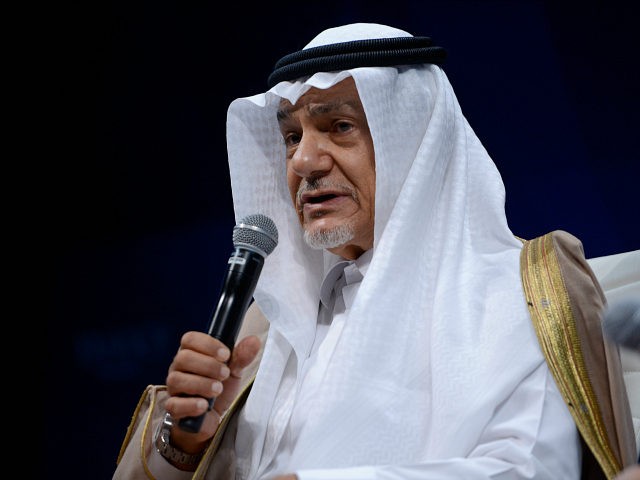PARIS, France — Saturday marked the first time in over 30 years that a leading figure from the Sunni Arab world publicly declared its support for the exiled, France-based National Council of Resistance of Iran (NCRI), an anti-Iranian regime opposition movement otherwise known as MEK (Mujahedin-e-Khalq).
“We support you, we are with you,” Prince Turki Al-Faisal, a member of the Saudi Arabian royal family said to the crowd that gathered at the Le Bourget convention center for the “Free Iran” rally. “We stand by your side to help you reach your goals,” he said.
Prior to Prince al-Faisal’s public support for the NCRI’s mission on Saturday, it was MEK leader and Massoud Rajavi who had turned to creating an alliance with his country’s enemy, Iraqi dictator Saddam Hussein, in the 1980s to help the opposition movement in its attempts to topple the Iranian regime. Many Iranians saw him as having betrayed Iran during the time. Some have even compared him with Edward Snowden. Others, still, have seen beyond the group’s past errors and cling to the hope for a free Iran as being a potential catalyst for supporting the NCRI’s current aims.
“Maryam Rajavi, your aim to rid your people of the cancer that is Khomeini is an historic epic and, like the Shahnameh, it will remain inscribed the annals of History,” Prince al-Faisal said, referring to the president-elect of the NCRI who had addressed the sea of an estimated 106,000 supporters earlier in the afternoon.
During her remarks, Rajavi encouraged the crowd that “the overthrow of the religious dictatorship [in Iran] is possible and within reach,” adding that “the question is not whether the ruling theocracy will be overthrown” but rather “how we can achieve this more quickly.”
Hours after the event took place, the Iranian regime issued a response to Turki’s comments and appearance at the rally, referring to his decision as “political impudence and stupidity” on his behalf. ABC News notes that the Iranian regime also alluded to “longstanding ties” between Saudi Arabia and MEK while accusing Saudi Arabia of giving “support to terrorism in the region and beyond” and accused the Sunni nation of sponsoring terrorism. Last month, the State Department released a report labeling the Islamic Republic of Iran as the world’s “leading state-sponsor of terrorism.”
The NCRI is also known as the People’s Mujahideen of Iran which also has the acronym MEK. The group was classified as a terrorist organization by the Iranian government and under President Bill Clinton’s administration in 1997, including by the EU and Canada. However, in 2010, the group won a major court victory, and by 2012, both the U.S. and Canada delisted MEK as a terrorist entity. It was under former Secretary of State Hillary Clinton that the group was removed from the list.
The decision by the latter Clinton was based in part on the group’s cooperation in moving over 3,000 of its members from Camp Ashraf in Iraq to Camp Liberty near Baghdad. Currently, there are approximately 1,000 MEK members still at Camp Liberty waiting to seek refuge in any nation that will accept them.
The timing of Prince Faisal’s appearance and support for the NCRI is critical as it appears to echo growing global frustration with the Iranian regime under the Supreme Leader Ayatollah Ali Khamenei.
Saudi Arabia and the Islamic Republic of Iran are currently locked in a regional war as the Sunni and Shia nations battle for hegemony in the Middle East. The United States’s decision to spearhead the implementation of the nuclear Iran deal has only exasperated the situation.
Prince Faisal, the former head of Saudi intelligence, also made an interesting statement during his speech on Saturday. He twice referred to Maryam’s husband, Massoud Rajavi, who NCRI’s organizers say has been in hiding for over 20 years to protect his life, as “marhoom”; a word used to describe a person who is deceased or has passed away.
His comment drew the attention of the Iran’s state-run Press TV which tweeted the clip shortly after:
In the clip, the translator appears to express some confusion over al-Faisal’s comments, which suggest MEK’s leader in isolation is no longer alive and pauses before omitting the word “late” from Massoud Rajavi’s name.
Al-Faisal’s statements may have also been a simple error. That remains to be determined. Many rumors suggesting Massoud is dead have been reported by pro-regime media outlets, although it is unique to hear that statement from a former member of the intelligence community. This is also the first time the former top official of a country is saying that Massoud Rajavi, the leader of MEC, is dead.
The prince also cited an Islamic theologian, scholar, and mystic Al-Ghazali, during his speech, drawing upon a common heritage both nation’s share, and noted that the man who is regarded by most Muslims as the second-most important figure in Islam “after the Prophet Muhammad, was from a city near Mashhad.”
This past March, al-Faisal also had sharp words of rebuke for President Barack Obama following the American commander-in-chief’s use of the term “free riders” to describe Saudi Arabia in a piece published by the Atlantic called “The Obama Doctrine.” Obama suggested the Saudis are getting a free ride, and Prince al-Faisal shot back with a public letter listing many foreign policy missteps taken by the Obama administration, going so far as to ridicule Obama’s philosophy of “leading from behind.”
In his response letter, the prince wrote, “We are not the ‘free riders’ … to whom you refer. We lead from the front and we accept our mistakes and rectify them.”
The signing of the Iran nuclear deal has been the source of much contention and has somewhat tarnished the perceived traditional alliance shared by the U.S. and Saudi Arabia.
Follow Adelle Nazarian on Twitter @AdelleNaz.

COMMENTS
Please let us know if you're having issues with commenting.